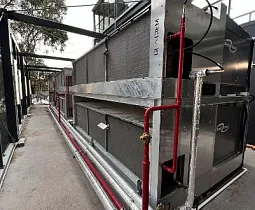Since the end of last year, the crisis of raw materials marked by supply problems and the rise in price of many of them, such as copper, oil and their derivatives, is having an impact on an essential sector, such as that of refrigeration, a situation that manufacturers have suffered for months and that, at the moment, is coming to affect the installers of refrigeration systems.
Given the current situation, demand is being covered with previous inventories, but the imbalance between supply and demand is accentuating. Many of the essential materials for the execution of CO2 installations are not available on the international market and distributors cannot guarantee short-term deliveries. Likewise, in the case of other materials needed in installations with other refrigerant gases, the delivery times are uncertain due to the collapse of the market. This circumstance affects both the execution of new facilities and the maintenance of existing ones.
Consequently, in the short term it is likely that the rise in prices of raw materials and the shortage of some of them are having an impact on current costs, especially in machinery and components. In addition, some non-essential activities could stop, a slowdown in investment and a decline in sustainable solutions based on clean technologies due to having to provide adapted solutions.
As Susana Rodríguez, president of AEFYT (Association of Cold and Cold Companies and its Technologies) points out, “at this time when the demand for the services of refrigeration and air conditioning companies is high, current market conditions are making that the efforts of these to obtain the necessary material to provide their services are unspeakable ”.
In short, the rise in the prices of most raw materials is having a great impact on the economy. In the opinion of AEFYT, everything indicates that it is urgent to adopt measures that favor an economic rebalancing from collaboration with public administrations, which must be actively involved, to boosting production in the European Union after decades of relocation. Only with the implementation of measures of this type will it be possible to stop the rise in prices of raw materials and avoid speculation that could lead to an even greater increase in the costs of certain materials, as well as mitigate inflation in industrial production
Background and global situation
It should be noted the shortage of certain electronic components that affect the manufacture of various equipment and accessories, to the extent that many ventilation systems incorporate chips and other components. In short, the current situation is marked by a destabilization in international industry that impacts multiple sectors, including refrigeration.
It is also a situation that affects all of Europe, with a very high dependence on Asia in terms of raw materials, accentuated by the trade war between the United States and China that has existed for years. To all this has been added the slowdown in the usual flow of goods by sea from China, one of the main channels of world trade, as a result of the new outbreaks of COVID-19. This repositioning has caused the collapse in different ports and has affected global markets and the entire logistics chain, to which must be added the high cost of freight during the last year, up to 400%. In this context, a significant effort is required from the logistics industry to respond to demand, which will probably require increasing its capacity by acquiring the necessary equipment in order to reduce waiting times.
It is a crisis whose end, experts and companies place no earlier than the end of 2021. Meanwhile, the prices of raw materials necessary in multiple production processes - steel, aluminum or copper - have reached increases of up to 80%. The rise in prices is so rapid that in certain raw materials it has reached up to three times its original cost over the last few months.
